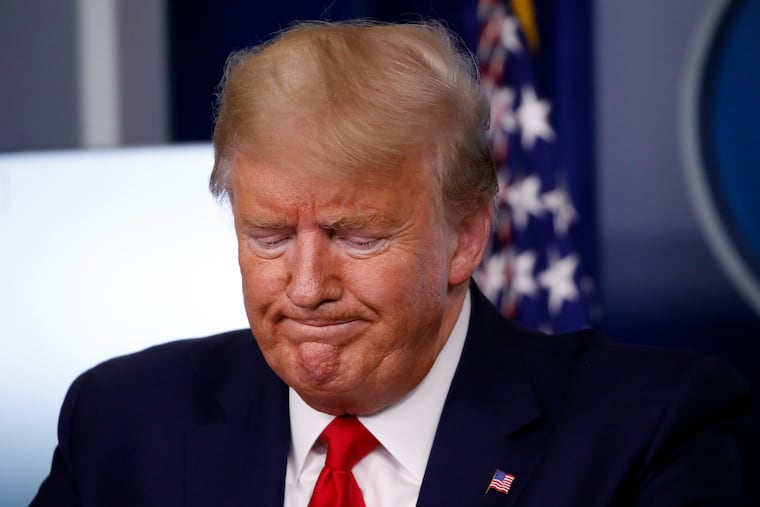Trump resists national quarantine despite grim coronavirus projections
The president is warning that Americans face a rough few weeks ahead, with tens of thousands likely killed by the virus.

WASHINGTON — Even as he warns of a grim few weeks ahead with tens of thousands of Americans likely killed by the new coronavirus, President Donald Trump is resisting issuing a national stay-at-home order to stem the spread of the disease.
Trump said earlier this week that he and members of his administration have discussed issuing a stay-at-home order but it was “pretty unlikely” for now. Then on Tuesday the White House offered “sobering” new projections that 100,000 to 240,000 Americans will likely succumb to the coronavirus even if current social distancing guidelines are maintained.
Surgeon General Jerome Adams on Wednesday noted in a series of television interviews that the U.S. federalist system leaves much of the authority on how to properly respond to catastrophes to individual state governors and local officials.
“We trust the governors and the mayors to understand their people and understand whether or not they feel like they can trust the people in their states to make the right decisions,” Adams said on ABC's “Good Morning America.”
The White House's best-case projection assumes statewide stay-at-home orders, according to a senior administration official familiar with Trump's thinking and speaking on condition of anonymity. Trump, the official said, is a believer in federalism and that it is up to individual governors to set restrictions for their states. The official noted that states are being hit by the virus with varying degrees of severity and they are best able to adapt the policies for their specific situations.
More than 235 million people live in the 33 states where governors have declared statewide shelter-in-place orders or have recommended that residents stay home.
In other states — places like Texas, Florida and Pennsylvania, among others — governors have resisted state-level decisions, but some localities have declared residents should stay at home. Those types of local orders cover Houston, Philadelphia, Atlanta, Orlando and St. Louis, along with dozens of other counties and cities.
Still, Trump — who has conducted long, near-daily briefings on his administration’s response to the virus outbreak over the last three weeks — has been reluctant so far to use his bully pulpit to urge governors to issue orders that would help effectively create a national quarantine.
The deference has come even as his administration has issued guidelines that have urged Americans to work from home if possible, cancel on-site learning at schools, and avoid large gatherings.
Florida Gov. Ron DeSantis, a Republican, said Tuesday that Trump's task force has not recommended he issue a state-wide quarantine order.
“If they do, obviously that would be something that carries a lot of weight with me,” said DeSantis, a Trump ally who leads one of the largest states yet to issue statewide orders. “If any of those task force folks tell me that we should do X, Y, or Z, of course we’re going to consider it. But nobody has said that to me thus far."
Rep. Donna Shalala, a Florida Democrat, said in an interview Wednesday that Trump's response has been “fragmented, weak and uneven.” She called on him to press governors for a unified approach to help stem the spread of the disease.
“He hasn’t made a national plea to say we’re all in this together, and he hasn’t even talked to the governors about all doing the same thing,” Shalala, who was secretary of health and human services under President Bill Clinton, said in an interview Wednesday. “I actually think they would, but he hasn’t even begun.”
—
Madhani reported from Chicago. Associated Press writers Meghan Hoyer and Dino Hazell contributed reporting.